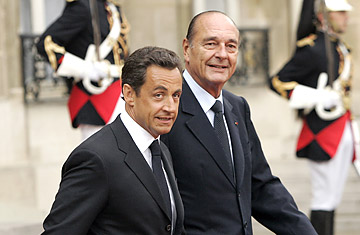
Outgoing French President Jacques Chirac, right, leaves the Elysee Palace in Paris, France, with successor Nicolas Sarkozy, Wednesday May 16, 2007.
Currently, conventional wisdom in France on the Chirac presidency is not exactly flattering. His hesitancy to press domestic reforms and willingness to alllow his policy decisions to be reversed by street protests has long caused fellow conservatives to grouse about national immobilisme.
And if France's economic stagnation were not taint enough on his presidential record, when his presidential immunity expires in June, Citizen Chirac may well face trial on corruption charges dating from his tenure as mayor of Paris in the 1980s and early 1990s.
Chirac's domestic legacy is unlikely to take on new shine with hindsight (especially if Sarkozy fulfills his own promises to take brisk and energetic action on reform), but it may be ameliorated by his foreign policy achievements. Many observers in France predict Chirac's presidency will over time enjoy the kind of foreign-policy-inspired revision that partially rehabilitated Richard Nixon's place in history.
"There's a tendency today to overlook or discount Chirac's considerable successes on the diplomatic stage — both for France, but also for the international community," says Dominique Reynie, a political commentator and professor at Paris' Fondation Nationale des Science Politiques. "Part of that is due to the lasting effects of the Bush Administration demonizing his stand on Iraq — ironic, since even most of the U.S. and British populations have come to agree with the rest of the world that Chirac's opposition was right all along. But another part is perspective: we often don't recognize the importance of certain actions until sufficient time has passed."
Chirac's impact on the world stage was immediate: his election in 1995 coincided with considerable stiffening of both French and European resolve to end fighting in ex-Yugoslavia, which saw them join with U.S.-led military actions that quickly ended the fighting. Chirac later paired with British Prime Minister Tony Blair to found Europe's Rapid Reaction Force as an alternative to overtaxed U.S. troops in responding to security crises. More recently, after the assassination of Lebanese Prime Minister and personal friend Rafik Hariri in 2005, Chirac teamed up with Washington to co-author a U.N. push to break Syria's hold on Lebanon, and to seek justice for those behind Hariri's murder. And despite the major setback he suffered in 2004 when French voters rejected the European Union constitution he supported, Chirac's strong pro-European positions made him a vital partner for German leaders seeking to push ahead wit h EU expansion and consolidation. In stark contrast to Sarkozy and many other conservative European leaders, meanwhile, Chirac has continued to back Turkey's eventual entry to the EU as reward for its dedication to secularism and democracy — and to prevent it from recoiling into fundamentalism should it be rejected as "too Muslim" for Europe.
The Chirac presidency will also be recalled as attentive to less powerful nations, embracing France's traditional pro-Arab policies in order to offset what many in the Middle East see as the carte blanche given Israel by Washington, and also promoting debt forgiveness in order to spur development. He has also emphasized the responsibility of the industrialized world to take the lead in combating the environmental crises whose greatest impact is on the poorest nations. Says Reyni, the sum of Chirac's foreign policy reflected a world-view "that stresses multilateralism, and supports cultural diversity as a manner of both enhancing peace and resolving conflict." And it is this combination of advancing French national interests while going to bat for smaller allies that often allowed France to punch beyond its diplomatic weight category. "In hindsight, I think we'll see Chirac viewed as the statesman who neglected the hard decisions at home in favor of projecting France and its interests around the world," Reyni concludes.
Which side of that equation will count more over time? "Foreign affairs," Reynie states with a laugh. "The economy may be what the average French person will complain about on any given day, but defending the grandeur of France is always what he will base a President's record on in the long run."
